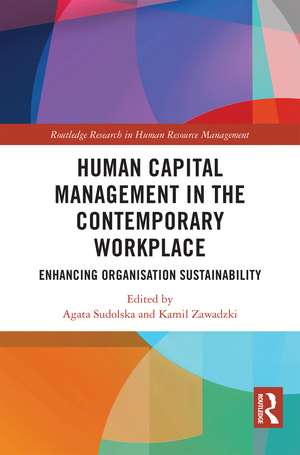Human Capital Management in the Contemporary Workplace: Enhancing Organisation Sustainability: Routledge Research in Human Resource Management
Editat de Agata Sudolska, Kamil Zawadzkien Limba Engleză Hardback – 12 iul 2024
Today, more than ever, human capital is regarded as the foundation of organisations and ought to be treated as such. Given the pivotal role of human capital management for ensuring the long-term organisational sustainability of an organisation, emphasis should be placed on redefining leadership strategies and priorities, focusing on diversity and inclusion, cultivating talent, facilitating remote work, fostering employee engagement, promoting skill development for environmentally friendly practices, and prioritising job satisfaction and employee well-being.
In response to the multi-faceted challenges of the third decade of the 21st century, this book provides an in-depth review of research avenues addressing present and future human capital development concerns in terms of enhancing organisation sustainability. The main aim of the book is to indicate the direction of demand for new competences regarding workplace human capital and identify synergies between its particular aspects with reference to contemporary human capital development. The monograph’s objectives include presenting tools that allow the analysis and development of human capital competences, pro-active and pro-environmental attitudes and behaviours, the coexistence of workers and AI in the organisation, as well as providing employee well-being, satisfaction, and commitment. Moreover, the book offers recommendations for contemporary responsible organisations that carry themselves towards the new economic and social order and sustainability.
Preț: 1002.26 lei
Preț vechi: 1222.26 lei
-18% Nou
Puncte Express: 1503
Preț estimativ în valută:
191.81€ • 198.15$ • 159.63£
191.81€ • 198.15$ • 159.63£
Carte tipărită la comandă
Livrare economică 25 martie-08 aprilie
Preluare comenzi: 021 569.72.76
Specificații
ISBN-13: 9781032673257
ISBN-10: 1032673257
Pagini: 188
Ilustrații: 4
Dimensiuni: 152 x 229 mm
Greutate: 0.43 kg
Ediția:1
Editura: Taylor & Francis
Colecția Routledge
Seria Routledge Research in Human Resource Management
Locul publicării:Oxford, United Kingdom
ISBN-10: 1032673257
Pagini: 188
Ilustrații: 4
Dimensiuni: 152 x 229 mm
Greutate: 0.43 kg
Ediția:1
Editura: Taylor & Francis
Colecția Routledge
Seria Routledge Research in Human Resource Management
Locul publicării:Oxford, United Kingdom
Public țintă
PostgraduateCuprins
Introduction 1. New directions of leadership in human capital development 2. Corporate entrepreneurship and employee green behaviour Chapter 3. Shaping organisational sustainability with green human capital 4. Diversity management as an essential component of sustainable development in the workplace 5. Working from home and human capital 6. Artificial Intelligence in HR 7. Talent management - Talent War 2.0 8. Positive HRM and employee well-being 9. Employee satisfaction and commitment 10. Conclusions
Notă biografică
Agata Sudolska is an associate professor at the Nicolaus Copernicus University in Torun, Faculty of Economic Sciences and Management, Head of Department of Human Resource Management, Poland.
Kamil Zawadzki is an associate professor at the Nicolaus Copernicus University in Torun, Faculty of Economic Sciences and Management, Department of Human Resource Management, Poland.
Kamil Zawadzki is an associate professor at the Nicolaus Copernicus University in Torun, Faculty of Economic Sciences and Management, Department of Human Resource Management, Poland.
Descriere
The main aim of the book is to indicate the direction of demand for new competencies regarding workplace human capital and identify synergies between its particular aspects with reference to contemporary human capital development.


